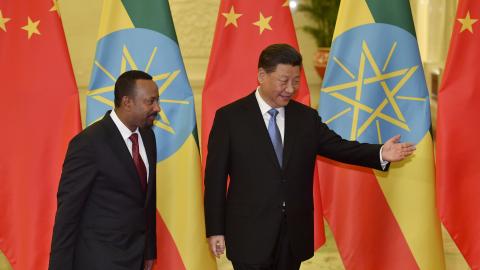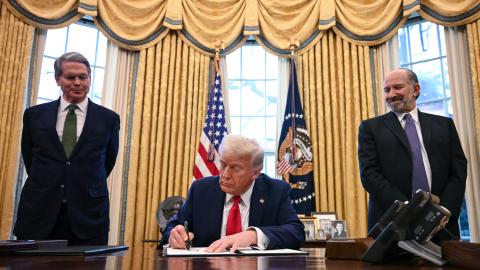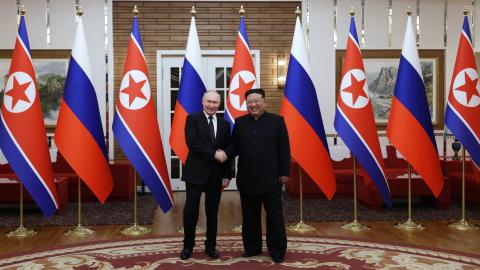Like any newly elected American President, Donald Trump must all too soon address international affairs that have been much ignored in the election.
Apart from competitors and adversaries he also faces allies, especially in Europe who, to put it politely, have evinced little appreciation for him and must now recalibrate their stance. Most strikingly, UK Foreign Secretary David Lammy has called him “deluded, dishonest, xenophobic, narcissistic” and a “neo-Nazi-sympathizing sociopath” Now Lammy dismisses this as “old news.” Others have been less alarmist and, especially in France, some take Trump’s election as a sign that Europe would take a more serious role in world affairs, including increasing defense spending.
More alarmingly, America and Europe now face a novel situation, one they have not faced for centuries, if ever.
Russia is seeking to recover its control over its western borderlands, notably Ukraine. Iran now combines its millennia-old attempts at westward imperial expansion with renewed attempts at Shiite hegemony, including blockading the Red Sea through its Houthi proxy and the eradication of Jewish political presence in the region. North Korea seeks partners to support its sacred monarchy and is sending weapons and soldiers to Europe. And behind them China assiduously represses, blackmails, or coopts others in a long-term project to recover its historical status as the world’s Middle Kingdom.
None of these is itself unusual. What is unusual is that they are establishing real alliances. China and Russia claimed in 2022 to have achieved a “no limits” alliance, later described by them as a ‘comprehensive partnership’ and ‘strategic cooperation.’ Iran is supplying drones and missiles to Russia. What is most unusual is that some 10,000 North Korean troops, whose numbers appear likely to increase, are now waging war in Europe, and unconfirmed Russian reports say that Ukrainian missiles have been killed some, including generals.
There is a developing Russia/China/Iran/NK axis with a contiguous landmass stretching from Japan to Norway to the Gulf to the Mediterranean. Together with China’s expanding hegemony extending in the South China Sea as far as Indonesia and the Philippines this presents a massive alliance that has not hitherto been faced in American history. Three of these are nuclear powers and may soon become four.
This situation may be illuminated by some macro-historical geopolitical analyses.
In a famous 1904 paper, Sir Halford Mackinder argued that the world could usefully be divided into the ”World Island,” comprising the interlinked continents of Asia, Europe, and Africa. This was and is the largest, most populous, and richest of all possible land combinations. Beyond this he listed “offshore islands” including Britain, Japan, Madagascar, the Indonesian Archipelago, Sri Lanka, and Taiwan. Finally, there were the ”outlying islands,” including North and South America and Oceania.
What he called the Heartland lay at the center of this World Island, stretching from European Russia to the Pacific and from the Arctic to the Himalayas. Later he postulated that whoever rules Eastern Europe commands the Heartland, whoever rules the Heartland commands the World-Island, and whoever rules the World-Island commands the world. At that time his principal concern was that European powers, notably Germany, might expand such control to the East, something that Hitler later attempted.
Most of us can probably critique this analysis in our sleep. No Eurasian hegemons have existed since the Mongols. With the exception of Russia, the relevant powers in the area have been relatively weak. While the Soviets controlled territory from central Europe to Kamchatka they could never “command the world” and only engaged with surrendering Japan in the waning days of WWII in order to grab the Kuril islands. That these countries share the world’s largest land mass is of course no guarantee of cooperation: in fact, it is more likely to lead to conflict. Hence, these powers have usually been at odds with each other. China and Russia have waged war. The Mongols from Genghis onwards dealt with this by giving offers that could not be refused. Its successors have lacked this ability. There are also the vicissitudes of history, such as the sudden collapse of Russia and Iran’s Syria satrap.
While this purported heartland has long been a divided area, Mackinder’s thesis of possibilities if it were not so divided has not been disproven. What if those in the area achieved greater unity, as now appears to be happening. Russia is drawing on Chinese munitions, Iranian drones and missiles, and now North Korean troops. Together they outweigh the US military and probably NATO.
Americans have usually been less than impressed with Mackinder’s views, perhaps exacerbated by his Eurocentric relegation of the Americas to third tier “outlying islands.” But this is not merely national pride since, as much of the 20th century has shown, the North American “outlying island” has shaped much of the globe.
Also, America’s overseas situation had already produced alternate geopolitical analyses, ones centered on sea power rather than land power, notably in the work of Alfred Mahan.
In 1890, Mahan, President of the Naval War College, published The Influence of Sea Power upon History, 1660–1783, stressing the importance of naval power in the rise of the British Empire. In this and subsequent work, he argued that British control of the seas, and the relative decline in the naval strength of its European rivals, enabled the United Kingdom’s rise as the world’s dominant military, political, and economic power. Mahan and others thought these ideas should guide U.S. foreign policy, as indeed they have over the last half century, with naval power enforcing freedom of the seas and U.S. hegemony.
Maher’s and Mackinder’s rival conceptions can come together in a stress on “offshore balancing,” that the U.S. and other perimeter powers should avoid military entanglements on Asian land with its large populations and instead form regional, usually offshore, alliances backed by sea power to prevent the rise of any competing continental power. The term itself is only a few decades old, but its substantive theory and practice in has been American strategy far longer, and earlier has been a staple of British foreign policy vis-a-vis rival European powers.
Much of what these global geopolitical analyses might suggest is neither novel nor distant from much current foreign policy. To thwart the rise of hegemonic continental hegemonic powers we should stress tensions in opponents’ alliances, as did Kissinger with Russia and China, who have had wars over disputed territories in East Asia. To vivify alliances with friendly European and Asian powers, such as with AUKUS, Five Eyes, and the “Quad” as, to its credit, the Biden administration has been doing. To stress the need for major and militarily weak European countries to follow frontline nations such as in the Baltic countries and Poland to begin realistic defense expenditures as, to their annoyance, Trump is likely to pressure them again to do. To heed the growing significance of India as a balancing Asian power. Behind all these, a sorely needed reinvestment in military, especially naval, modernization and expansion.
One does not need Mackinder’s analyses to propose these policies. But his work suggests both novelty and urgency. It highlights the potential dangers of this budding alliance of Eurasian powers. Europeans need especially to wake up to the fact that soldiers from an East Asian country, the most repressive one in the world, are now engaged in war within Europe itself. The danger is not Asian countries per se, where there are great friends to democracy, but the current alliance of “world island” authoritarian and repressive powers.
The debates about whether we should pay more relative attention to China than to say Russia in Ukraine, or Iran or North Korea, are vital but now need now to pay more attention to the fact that they are now allies across Eurasia, the world’s largest and potentially most potent continent. This is a situation we have not faced before.
Enjoyed this op-ed? Subscribe to Hudson’s newsletters to stay up to date with our latest content.


















